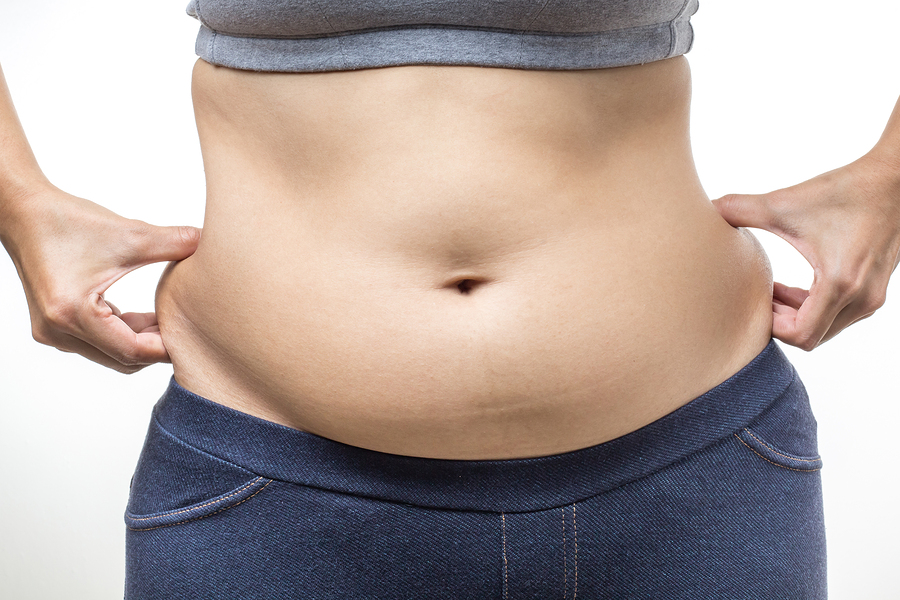Move over fad diets and fat-melting jiggle machines – we’ve got the real scoop on how to shed the kilos (backed by science and genuine success stories).
Whether you’re looking to lose weight for health reasons or aesthetic ones, the process is virtually the same: exercise and eat (real food) only when hungry. It’s generally not too complicated but it can be challenging, especially when you’re first starting out.
We’ve compiled a 12-step journey to losing weight. Ensure that you have a chat with your doctor before you start as not all weight loss advice suits everybody. Your doctor can help you set realistic, safe goals (such as how much exercise you should do) and establish whether there are any issues around medications or health conditions that need to be dealt with. See your doctor if you are facing issues around eating, such as binge eating (consuming large amounts of food at once), purging or losing a significant amount of weight quickly.
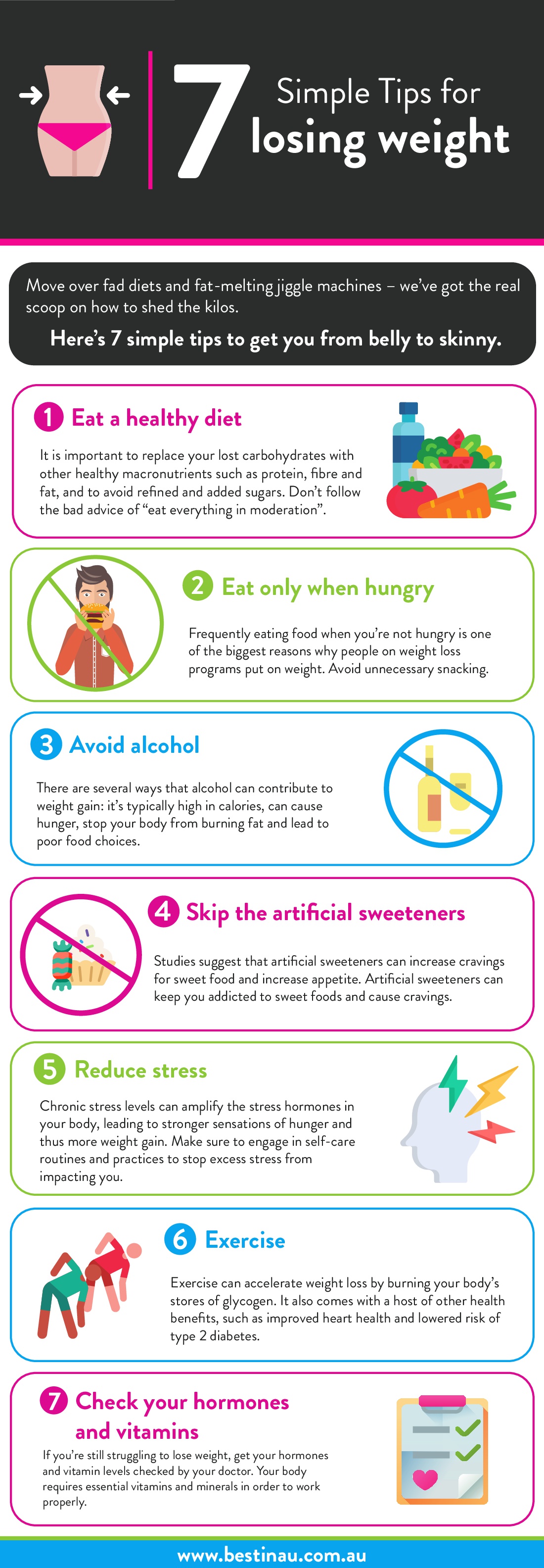
Keep in mind that losing weight isn’t a linear process – there will be some days where your weight goes down and some days where it goes up. However, you should find that over a span of several weeks and months your weight is going down overall. If you’re also weight training, it’s possible to temporarily put on weight due to an increase in muscle mass.
Go low-carb
For over 150 years, people have used the low-carb diet as an effective way to lose weight. Modern scientific studies have shown that it is the best way to lose weight. Why? Because eating low-carb reduces levels of insulin, which causes your fat deposits to shrink and expel their energy. A study has shown that people consuming a low-carb diet lost over 300 extra calories a day at rest, meaning you’ll lose extra weight without having to do extra exercise.
Low-carb diets offer other benefits, too. They lower your blood pressure, blood sugar and triglycerides, whilst raising good HDL and improving cholesterol.
Of course, low-carb isn’t no-carb; carbohydrates provide an important source of energy to fuel our bodies, so it’s important to still include some in your diet. Aim for natural carbs found in vegetables, fruits, beans and whole grains and avoid refined, processed carbs found in white rice and white bread.
The amount of carbs you should consume depends on the individual; factors such as current overall health, body composition, age, gender and levels of activity determine how many carbs a person should consume. For instance, someone eating a 2000-calorie diet should typically consume around 50-150 grams of carbs per day in order to lose weight. Experiment to find out what works for you, or see a doctor or personal trainer for personalised advice.
Eat a healthy diet

It is important to replace your lost carbohydrates with other healthy macronutrients such as protein, fibre and fat, and to avoid refined and added sugars. Don’t follow the bad advice of “eat everything in moderation” – junk foods are never going to be good for you. Besides, after a few months, your body is unlikely to miss junk food at all.
Fat tends to get a bad rap, however low-fat diets have been largely discredited. Good fats are highly healthy and can help satiate you. Try to get a good balance of monounsaturated and polyunsaturated fats in your diet and avoid trans and saturated fats where possible. Monounsaturated fats can reduce the risk of heart disease and are found in foods such as olive, canola, sunflower and peanut oil, nuts and avocados. Polyunsaturated fats are essential fats which your body can’t produce (but needs to function). They help build cell membranes and nerve encasings, help with inflammation, blood clotting and muscle movement. They can also reduce your blood pressure, and prevent and treat heart disease and stroke. You can get them from canola, corn and safflower oil, flaxeeds, walnuts and fatty fish like sardines and salmon.
While dairy, fruit and nuts can be enjoyed in moderation, don’t overindulge. The lactose in dairy can slow down the weight loss process and create a strong insulin response (butter is the exception to this). Nuts can contain a large amount of carbohydrates, so watch out that you’re not eating too many – cashews are one of the worst (20% carbs by weight). And fruit typically contains a large amount of sugar (mangoes contain 46 grams of sugar!). Swap high-sugar dried and tropical fruits for low-sugar berries, lemons and limes. Kiwifruit, apricots, rhubarb and guavas are low in sugar, too.
Eat only when hungry

Frequently eating food when you’re not hungry is one of the biggest reasons why people on weight loss programs put on weight. Avoid unnecessary snacking.
Some of the common snack foods people overeat include:
Nuts
Nuts are an easy thing to keep eating, so make sure you portion them out into a small bowl rather than taking the whole bag with you to the couch. Studies suggest that salted nuts are more difficult to stop eating than unsalted nuts, so opt for unsalted where possible.
Dairy
Dairy is another food group that is easy to binge on. Cheese and cream are some of the biggest culprits, frequently making their way into coffees and salads. It’s fine to have some, just don’t go mindlessly overboard.
Low-carb baked goods
We can get carried away sometimes with how proud we are of our almond-flour and agave-nectar-brownies and eat one, two or three too many…and then find we’re putting on weight. Stick to having one every now and then as a treat rather than a daily staple.
Instead of snacking, try to stick to your three main meals – though if you’re not feeling hungry at breakfast (or any meal for that matter), don’t eat.
Some tips for avoiding excessive snacking include:
Staying busy
Being occupied with work, family commitments, hobbies and your social life can help keep your mind off the desire to eat.
Limiting your portion sizes
Having a whole bag of chips or nuts (even if they’re healthy ones) open on your desk makes it all too easy to overindulge. Grab a small bowl and put a handful of food into it – this stops you from mindlessly consuming too many calories.
Mindfulness
Studies have shown that people who eat mindfully enjoy their food more and have less of a struggle controlling their eating. Mindfulness is the Buddhist practice of being aware of oneself and one’s surroundings and being tuned into one’s senses. Mindfulness can help reduce stress and improve digestion.
You can practice mindful eating by:
- Paying attention to the sensory experience of eating; focus on the textures, colours, smells and flavours of your food
- Getting rid of distractions such as the television when eating
- Being aware of feelings such as anxiety and guilt around eating and releasing these feelings (or dealing with them with the help of a therapist)
- Eating in silence for 5 minutes and considering everything that went into your meal, from the farmer to plate
- Eating slowly using small bites
- Using chopsticks or your non-dominant hand to eat with
- Tuning into your body when you get a craving; ask yourself if you’re really hungry or whether you’d rather go for a walk or read a book.
Avoid alcohol

There are several ways that alcohol can contribute to weight gain: it’s typically high in calories, can cause hunger, stop your body from burning fat and lead to poor food choices. While weight gain depends on factors such as age and gender, how much you drink, what kind of alcohol you’re drinking and what you eat whilst drinking, it’s a good idea to try to avoid it if you can.
If you are going to drink, try to stick to wine, dry champagne or hard liquor like vodka or whisky as these are low in sugar and carbs. Sweetened cocktails and other sweetened drinks like champagne aren’t ideal. Beer is possibly the worst drink for losing weight as it consists of quickly digested carbs that stop fat from being burned.
Skip the artificial sweeteners
Studies suggest that artificial sweeteners can increase cravings for sweet food and increase appetite. This may be due to the fact that when the body detects a sweetener, it boosts the secretion of insulin in the expectation of sugar – when no sugar comes, blood sugar lowers and hunger increases. Artificial sweeteners can keep you addicted to sweet foods and cause cravings. Plus, the long-term effects of artificial sweeteners on the body are not known.
Note: Stevia is not a natural sweetener; this is a marketing gimmick. While it is derived from the stevia plant, the Nestle brand Stevia is processed with ethanol in a lab and is therefore not natural.
Get enough rest
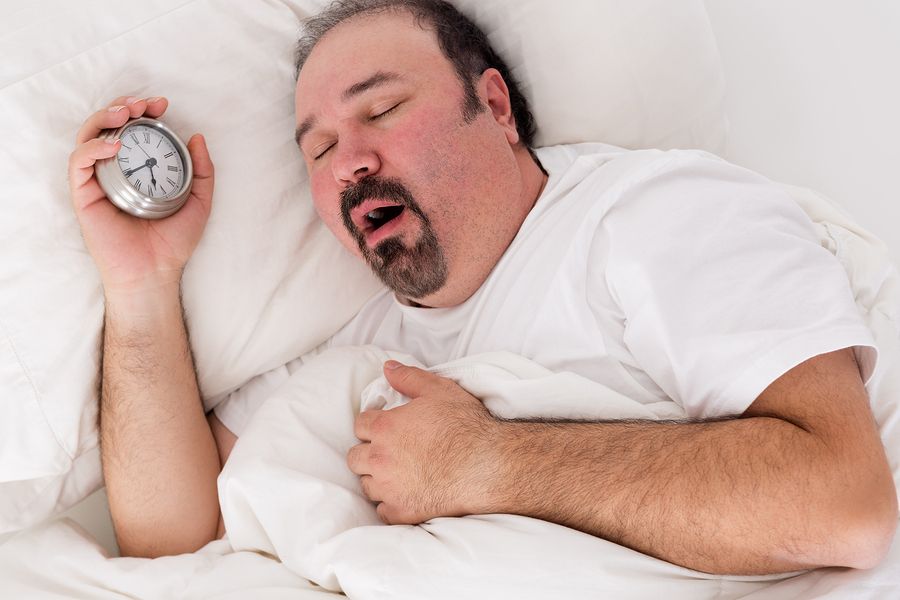
Did you know that getting plenty of sleep is almost (possibly even equally) as important as your diet? Studies have shown that poor sleep is linked to a higher BMI, increased appetite, lower self-control and weight gain. Plus, sleep disorders such as sleep apnea are made worse by weight gain.
In contrast, getting enough sleep can help you to fight cravings, give you the energy to exercise and stay disciplined, and prevent insulin resistance. You can create healthy sleeping habits for yourself by doing the following:
- Increase bright light and sunlight exposure during the day, and reduce blue light exposure at night to maintain a healthy circadian rhythm
- Avoid caffeine late in the day
- Avoid eating late at night
- Limit irregular or extensive daytime naps
- Wake up and go to bed at consistent times
- Get a melatonin prescription from your doctor (over-the-counter forms aren’t as effective)
- Avoid alcohol, which can increase sleep apnea symptoms and snoring
- Set a comfortable bedroom temperature (around 20 degrees)
- Practice relaxation techniques before bed, such as meditation, a hot bath, a massage, deep breathing and listening to relaxing music.
Reduce stress
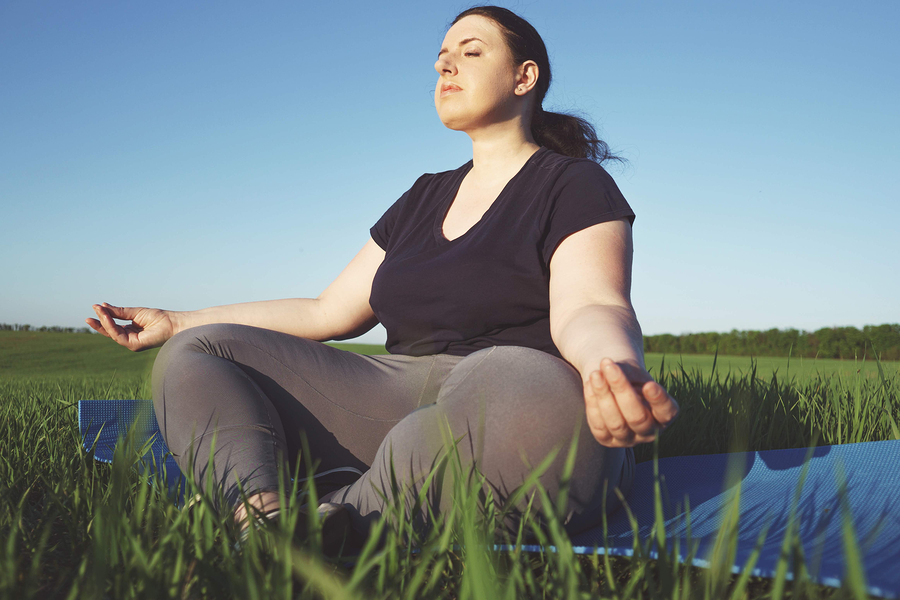
Chronic stress levels can amplify the stress hormones in your body, leading to stronger sensations of hunger and thus more weight gain. Make sure to engage in self-care routines and practices to stop excess stress from impacting you. Some tips for reducing stress include:
- Engaging in relaxation practices such as meditation, mindfulness, yoga/pilates, bathing, art-making, journaling, massage, deep breathing, visualisation, and listening to relaxing music
- Exercise
- Seeing a psychologist or counsellor
- Getting a good night’s rest
- Having work-life balance.
Assess medications
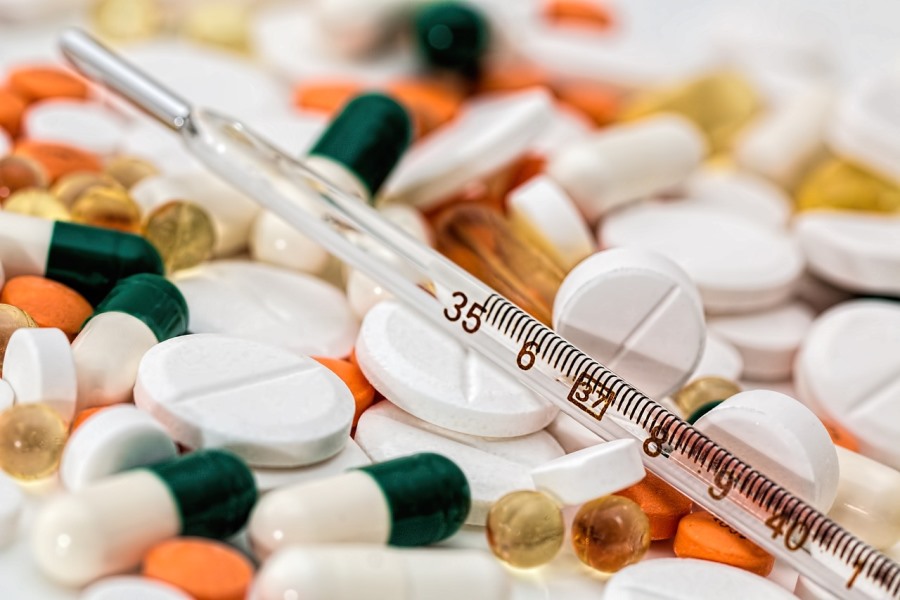
You may want to review the medications you’re taking with your doctor – many prescription medications can hinder weight loss. While you may be required to continue taking the drug, you may be able to adjust it to a smaller dosage – chat with your doctor. Some of the biggest culprits are:
Cortisone
The oral drug (not so much in its topical or nasal forms) often leads to long-term weight gain, especially when taken at a high dosage.
Insulin injections
Especially when taken at a high dose, these are one of the major barriers for weight loss. You may be able to deal with this by eating less carbs, treating with Metformin or trying a different drug.
Other diabetes drugs
Medications which release insulin, such as Glibenclamide, Avandia, Minodiab, NovoNorm, Daonil and Starlix, can often lead to weight gain. Metformin doesn’t seem to, however.
Antidepressant medications
Some antidepressants are reported to cause weight gain, such as Tryptizol, Remeron, Clomipramine, Saroten, and Lithium. SSRI’s like Citalopram and Sertraline don’t appear to affect weight as much.
Some contraceptives
Contraceptives which contain only progesterone with no estrogen, such as the mini-pill, implant and injection, may lead to a slight gain in weight.
Allergy drugs
Antihistamines, especially when taken at a high dosage, may lead to weight gain.
Blood pressure medications
Those in the form of beta blockers, such as Atenolol and Seloken, can contribute to weight gain.
Epilepsy drugs
Epilepsy medications such as Valproate can lead to weight gain.
Look after your gut bacteria

There are trillions of good bacteria in your body, working hard to keep you healthy. Most of the bacteria are located in your intestines (the “gut”), where they produce vitamins, help with inflammation and communicate with the immune system to ward off infection. Importantly, the bacteria also affect digestion and create chemicals that make you feel full.
Studies have shown that people who are obese have different (and less diverse) bacteria in the gut to non-obese people. Certain types of gut bacteria can digest fibre, helping with weight loss. They can also help you feel fuller which can help stop you from overeating.
As such, it is important to take care of your gut bacteria by consuming foods which help, rather than harm them.
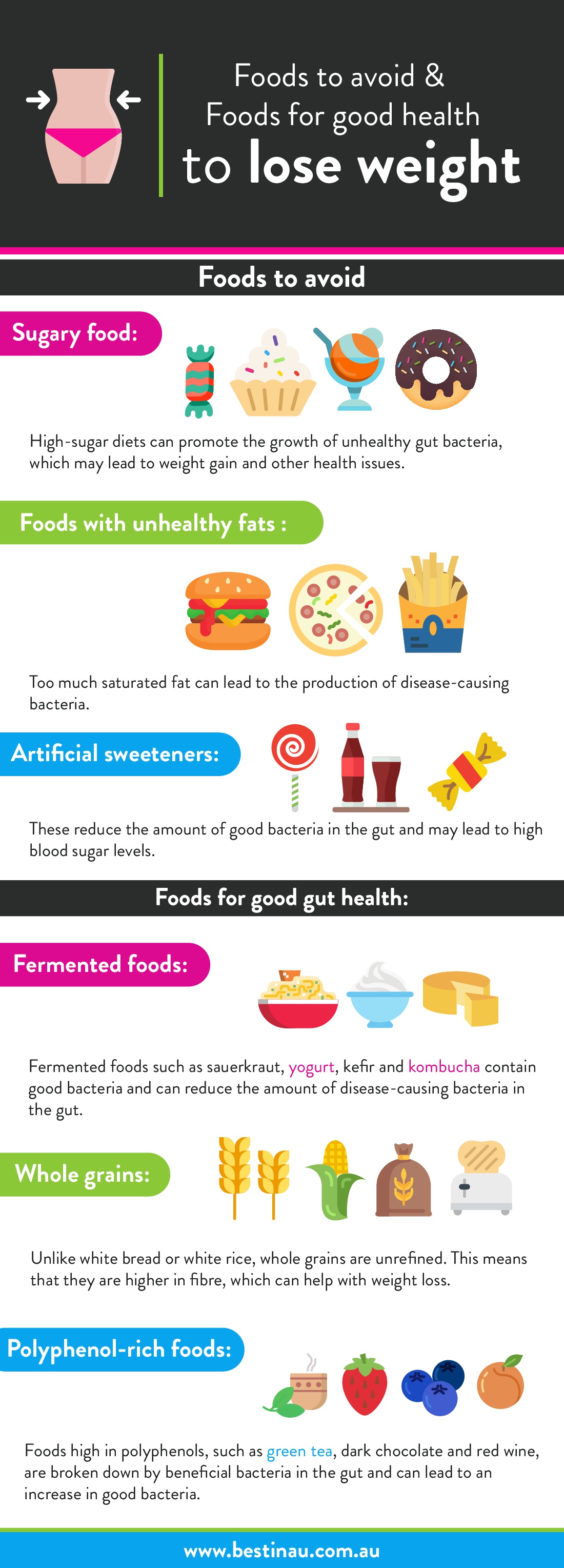
Foods to avoid:
- Sugary food: High-sugar diets can promote the growth of unhealthy gut bacteria, which may lead to weight gain and other health issues.
- Foods with unhealthy fats: Too much saturated fat can lead to the production of disease-causing bacteria.
- Artificial sweeteners: These reduce the amount of good bacteria in the gut and may lead to high blood sugar levels.
Foods for good gut health:
- Fermented foods: Fermented foods such as sauerkraut, yogurt, kefir and kombucha contain good bacteria and can reduce the amount of disease-causing bacteria in the gut.
- Whole grains: Unlike white bread or white rice, whole grains are unrefined. This means that they are higher in fibre, which can help with weight loss.
- Polyphenol-rich foods: Foods high in polyphenols, such as green tea, dark chocolate and red wine, are broken down by beneficial bacteria in the gut and can lead to an increase in good bacteria.
Exercise
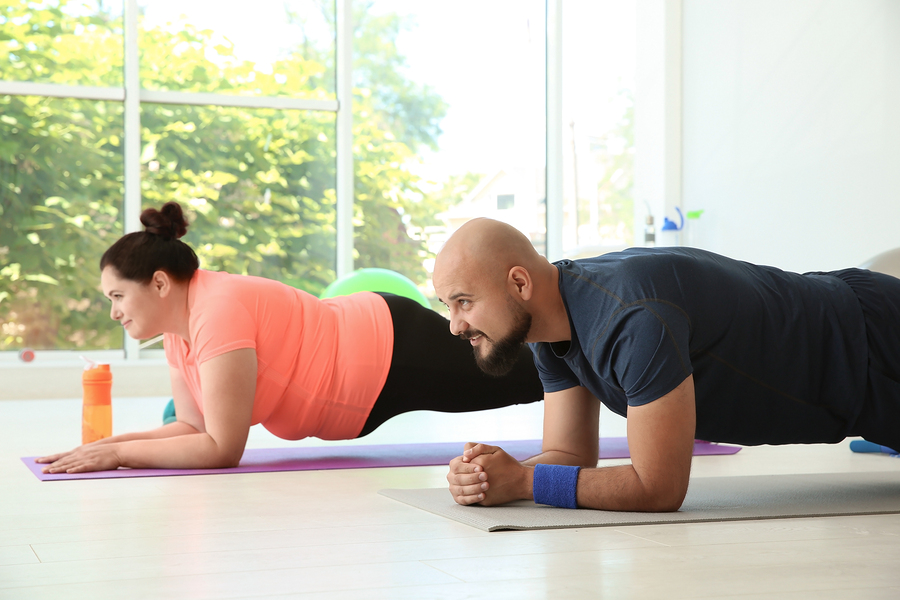
Exercise isn’t the first step in your weight loss journey for a reason – your diet is arguably the most important factor. Your body expends calories not just through exercise (which contributes around 10-30%) – 60-80% of it is used by your basal metabolic rate and 10% through digestion. Exercise can increase your appetite, potentially leading to over-eating if you’re not careful. Experts suggest that if you’re trying to lose weight, it’s better to eat less than to exercise and eat the same amount.
However, exercise can accelerate weight loss by burning your body’s stores of glycogen. It also comes with a host of other health benefits, such as improved heart health and lowered risk of type 2 diabetes.
The good news is that you don’t have to run on the treadmill for an hour a day – even walking, fidgeting and typing can burn calories. Focus on doing physical activity you enjoy – like dance, golf or tennis – several times a week, rather than spending 2 hours at the gym every day.
Aim for optimal ketosis
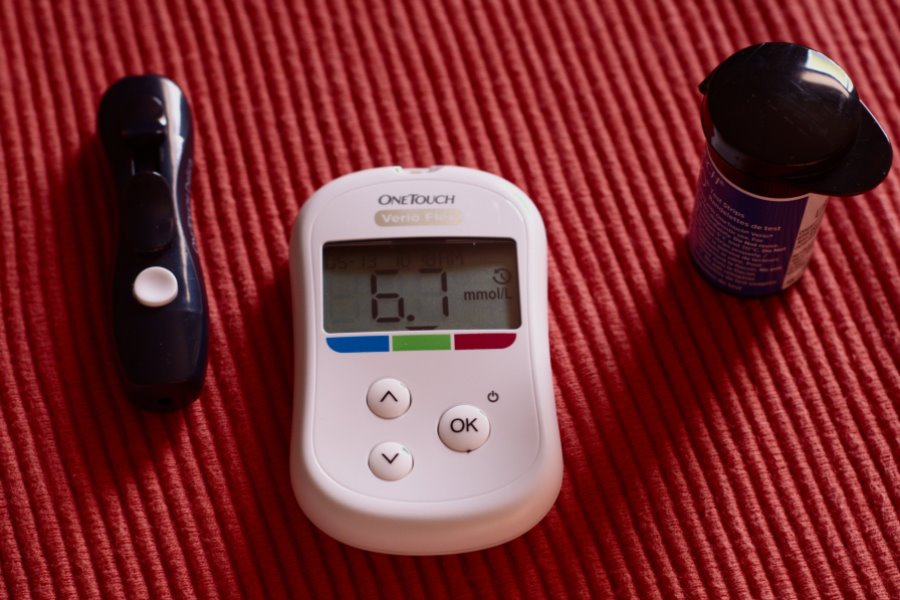
Skip this step if you’re a type 1 diabetic. If you’re struggling to lose weight and have tried the other steps, optimal ketosis may be able to help. This involves getting your body into a state in which you have a very high rate of burning fat, whereby you have a sufficient amount of ketones in your bloodstream. Ketones are proof that your levels of insulin are low.
To measure your ketones, get yourself a blood ketone meter, which works by pricking your finger with a needle to test your ketone levels. If you can’t afford one, you can use urine test sticks, which aren’t as reliable but are cheaper. It is best to test your blood ketones in the morning (before breakfast).
- < 0.5 mmol/L is not ketosis. You’re far from ideal fat-burning.
- 5-1.5 mmol/L is light ketosis. You’re getting a decent effect, but not optimal.
- 5-3 mmol/L is optimal ketosis. You’re in the maximum weight loss zone!
- > 3 mmol/L isn’t necessary. You’re not getting any benefits that you weren’t getting in the optimal zone. Higher numbers may mean you’re not getting enough food.
To achieve optimal ketosis, reduce your carbohydrate intake and be cautious of your protein intake – large amounts of protein may be converted into glucose in the body, raising your insulin levels. To do this, try to put more fat into your diet – “fat coffee” is a popular trick which works to fill you up more whilst achieving optimal ketosis.
Check your hormones and vitamins

If you’re still struggling to lose weight, get your hormones and vitamin levels checked by your doctor.
Your body requires essential vitamins and minerals in order to work properly. Some studies suggest that having enough of them can reduce hunger and cravings, thus aiding weight loss. The two most well-researched vitamin supplements for weight loss are:
Multivitamins
A study found that people who took a multivitamin for 6 months lost 3kg more weight and had better health markers than people who took a placebo. This suggests that taking a multivitamin may be beneficial.
Vitamin D
Another study found that when compared to a placebo, Vitamin D supplements reduced fat weight and waist measurement. Vitamin D may be worth supplementing if you are deficient.
Hormone wise, there are three key ones to consider:
Thyroid hormone
For people with hypothyroidism (thyroid hormone deficiency), decreased metabolism may be an issue that causes them to gain weight. Symptoms include constipation, fatigue, dry skin and weight gain. Your doctor may get you to take a blood test to find out if you are deficient. If so, you can take an oral supplement and/or consume more iodine.
Stress hormones
Stress hormones such as cortisol can lead to an increase in appetite and thereby weight gain. Stress hormones are, as you can imagine, elevated by chronic stress and not getting enough sleep.
Sex hormones
An imbalance of sex hormones can also lead to weight gain. Check with your doctor to find out if you have any of the following:
Women
Polycystic ovarian syndrome can increase testosterone and insulin levels, which can lead to weight gain, infertility, acne, menstrual issues and excess hair growth. Menopause can cause levels of estrogen to drop, leading to weight gain especially around the belly.
Men
Proceeding middle age, men’s levels of testosterone start to drop, leading to an increase in weight gain (especially around the gut) and a loss of muscle mass.
Your doctor may be able to prescribe you a supplement if they deem it suitable.
Conclusion
Losing weight doesn’t have to be difficult. See your doctor to get help creating a personalised weight loss plan to maximise your chances of success. And remember to be patient!

